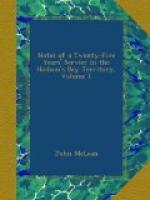Should the summer and fall hunt prove successful, the Esquimaux is one of the happiest animals in the creation. He passes his dreary winter without one careful or anxious thought; he eats his fill and lies down to sleep, and then rises to eat again. In this manner they pass the greater part of their time; night and day are the same, eating and sleeping their chief enjoyments. When, however, they do rouse their dormant faculties to exertion, they seem to engage with great good-will in the few amusements they have, the principal of which is playing ball, men and women joining in the game. Two parties are opposed, the one driving the ball with sticks towards the goal, the other driving it in the opposite direction; in short, a game of shinty. They have dancing too,—ye gods! such dancing! Two rows of men and women, sometimes only of one sex, stand opposite to each other, exhibiting no other motion in their dancing than raising their shoulders with a peculiar jerk, bending their knees so as to give their whole bodies, from the knee upwards, the same motion, and grinning horribly at each other, while not a foot stirs.
As to the music to which this dance is performed, I know not well how to describe it. By inflating and depressing the lungs so as to create a convulsive heaving of the breast, a sound is produced, somewhat similar to the groans of a person suffering from suffocation; and it is to this sound they grin, and jerk their shoulders. The whole performance is quite in keeping; the music worthy of the dancing, the dancing worthy of the music. They have boxing too, but do not practise the art after the fashion of the Cribs and Coopers; they disdain to parry off the blow; each strikes in turn with clenched fist; the blow is given behind the ear, and, as soon as one of the parties acknowledges himself defeated, the combat ceases. They are also adepts at wrestling; I have witnessed frequent contests between them and the inland Indians, when the latter were invariably floored.
No one enjoys a joke better than an Esquimaux, and when his risibility is excited he laughs with right good will, evincing in this, as in every other respect, the difference of disposition between them and the Indians, whose rigid features seldom betray their feelings. Much the same diversity of character and disposition is to be observed among the Esquimaux as among other barbarous tribes. Some instances of disinterested kindness and generosity fell under my notice while residing among them, that would have done honour to civilized man.
An Esquimaux who had attached himself to the establishment from the time of our first arrival at Ungava, kept a poor widow and her three orphans with him for several years, and seemed to make no difference between them and the members of his own family. It must be acknowledged, however, that the unhappy widows seldom fall into so good hands; their fate is the most wretched that can be imagined, unless they have children that can provide for them. In years of scarcity they are rejected from the community, and hover about the encampments like starving wolves, picking up whatever chance may throw in their way, until hunger and cold terminate their wretched existence.




